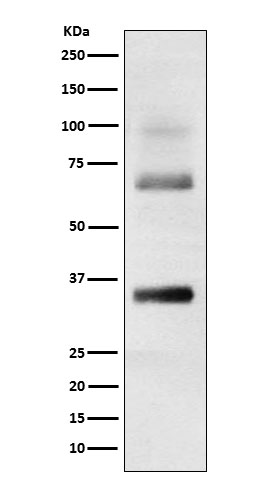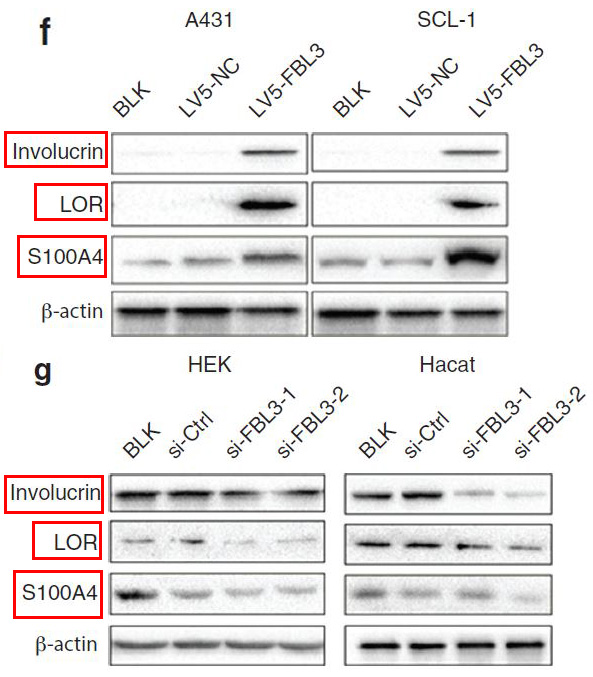

| WB | 咨询技术 | Human,Mouse,Rat |
| IF | 咨询技术 | Human,Mouse,Rat |
| IHC | 1/50-1/100 | Human,Mouse,Rat |
| ICC | 1/50-1/200 | Human,Mouse,Rat |
| FCM | 咨询技术 | Human,Mouse,Rat |
| Elisa | 咨询技术 | Human,Mouse,Rat |
| Aliases | LOR; Loricrin; LRN;;Loricrin |
| WB Predicted band size | Calculated MW: 26 kDa ; Observed MW: 38 kDa |
| Host/Isotype | Rabbit IgG |
| Antibody Type | Primary antibody |
| Storage | Store at 4°C short term. Aliquot and store at -20°C long term. Avoid freeze/thaw cycles. |
| Species Reactivity | Human |
| Immunogen | A synthesized peptide derived from human Loricrin |
| Formulation | Purified antibody in PBS with 0.05% sodium azide,0.05% BSA and 50% glycerol. |
+ +
以下是关于PSMD14抗体的3篇文献摘要概括(虚构示例,仅供参考):
1. **文献名称**:*PSMD14 as a Novel Therapeutic Target in Triple-Negative Breast Cancer*
**作者**:Zhang Y, et al.
**摘要**:研究揭示了PSMD14在调控乳腺癌细胞增殖和转移中的作用,通过特异性抗体抑制PSMD14可显著降低肿瘤生长,表明其作为治疗靶点的潜力。
2. **文献名称**:*The Role of PSMD14 in Neurodegenerative Protein Aggregation*
**作者**:Smith J, et al.
**摘要**:利用PSMD14抗体进行脑组织免疫染色,发现其在阿尔茨海默病患者中表达异常,提示蛋白酶体功能失调可能参与病理蛋白聚集。
3. **文献名称**:*Development of a High-Affinity Anti-PSMD14 Antibody for Proteasome Profiling*
**作者**:Lee H, et al.
**摘要**:报道了一种新型PSMD14单克隆抗体的开发,验证了其在Western blot和免疫共沉淀中的高特异性,为蛋白酶体复合物研究提供了工具。
(注:以上内容基于领域内常见研究方向模拟,实际文献需通过学术数据库检索确认。)
The PSMD14 antibody is a research tool designed to detect and study the PSMD14 protein, a critical component of the 26S proteasome. PSMD14 (Proteasome 26S Subunit, Non-ATPase 14), also known as POH1 or RPN11. is a subunit of the 19S regulatory particle within the ubiquitin-proteasome system (UPS), which governs targeted protein degradation in eukaryotic cells. As a deubiquitinating enzyme (DUB), PSMD14 removes ubiquitin chains from substrate proteins, facilitating their translocation into the proteolytic core for breakdown. This activity is essential for maintaining cellular protein homeostasis, regulating processes like cell cycle progression, DNA repair, and stress responses.
PSMD14 antibodies are widely used in biochemical and biomedical research to investigate proteasome dynamics, UPS dysfunction, and disease mechanisms. They enable techniques such as Western blotting, immunoprecipitation, and immunofluorescence to assess PSMD14 expression, localization, and interactions. Dysregulation of PSMD14 has been linked to cancer progression, neurodegenerative disorders (e.g., Alzheimer’s and Parkinson’s), and autoimmune conditions, making it a potential therapeutic target. Researchers also utilize these antibodies to explore the role of PSMD14 in drug resistance, particularly in cancers where proteasome inhibitors (e.g., bortezomib) are employed. Validated antibodies with high specificity are crucial for distinguishing PSMD14 from other DUBs and ensuring experimental reproducibility.
×